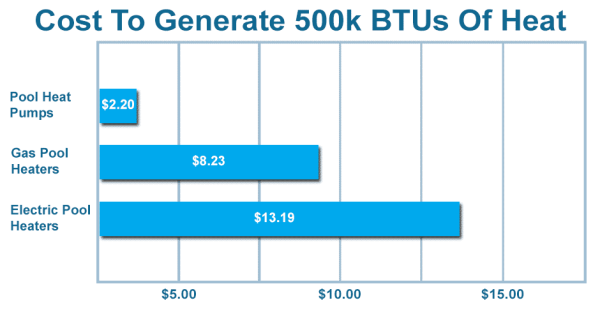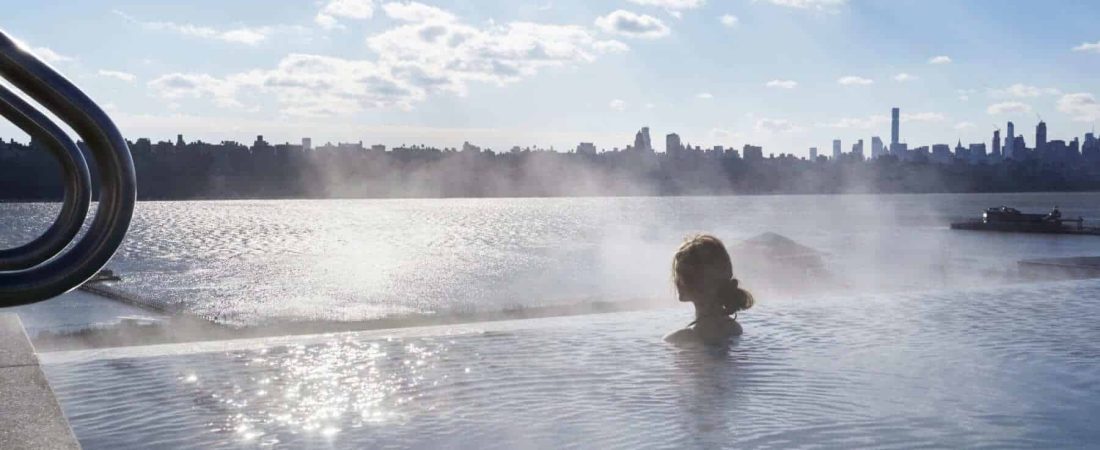On a winters day even in Florida, the pool/spa water can be as cold as 53 Degrees (F), now bringing it up to 85 degrees (F) when the outside ambient air temperature says 45 degrees (F), is going to need a serious device and takes time.
Gas Heaters, Heat Pumps you may call them Electrical Heaters and then we have Solar… The last option is very questionable.
Pool Heat Pumps
By creating heat this way, it is the most economical form of pool/spa heating by far, costing a fraction of the operating costs of gas. It takes longer to heat the pool/spa than a gas heater, but not significantly. In some colder climates, it is not the ideal solution, in Florida it certainly is. Definitely the ideal solution, combining efficient heating and very low operational costs. All quality manufactured Heat Pumps now utilize titanium coated heat-exchangers that are impervious to pool/spa chemicals which ensures longevity. This with the addition of environmentally friendly 410A freon makes the new Heat Pumps one of the most modern designed forms of pool/spa heating. Pool heat pumps in the past used copper type heat exchangers and R22 freon gas, virtually all sprang leaks due to chemical erosion of the heat exchanger, the lower pressure R22 freon also meant they were way less efficient. Today’s modern units will run even when outside temperatures hit the low 40’s. Some with additional equipment such as accumulators will operate with temps down in the ’30s.
Gas? Natural or Propain??? Yes, we spelled it like that on purpose…
There are many in residential pools/spas, their initial purchase cost is lower than a heat pump. The advantages of gas are quicker heating, although we are still talking many hours in an average size pool and around an 30 minutes to an hour + in a average size spa, low footprint, heat always available, even in freezing weather.
Their big disadvantage is high operating costs as they physically boil water and their lifespan is normally nowhere near as long as heat pumps. The disadvantage is even more significant where Natural piped gas isn’t available and propane tanks have to be utilized, then as well as crazy operating costs and rare explosive possibilities there is the added nuisance of having to keep filling the propane tanks. So if you have a mega-sized hotel type pool or spa or live in a very cold climate, gas is most likely your only solution to obtain the heat you need.
Solar or Solame???
Add to this high purchase and installation cost and the fact it’s going to most likely fly off taking your roof with it in a Florida Hurricane or tropical storm, or leak at some stage flooding your precious home.
We do however encourage and recommend solar electricity panels combined with a heat pump, (electric heater) for maximum efficiency.

Answers to some questions you may have after reading this article...
Yes, there is no reason to use gas in Florida anymore, unless your pool or spa is a large commercial one.
Most likely yes, in some rare cases no however 9 out 10 homes without an existing heat pump requires an electrical wire run, by a licensed electrical contractor.
Yes, most things are fixable, however, to fix an old unit would not be a good economical decision, best to replace it and spend your hard-earned cash on a unit with a warranty.
In most cases no, its just not a good decision throwing money into fixing old units older heat pumps will certainly be using the R22 Freon gas which is now Banned and although it is still available for repairs it is mega expensive. Keep in mind all of the parts are old and like putting good money into old cars, just not worth it, because next week something else will likely fail.
Depends, all electric heaters disperse condensation at the bottom, this is normal, this is different from an actual water leak only close inspection will tell. If the pool/spa is not losing water then it is not leaking.
It shouldn’t be if everything is installed and maintained professionally. Gas is riskier than electric simply due to the combustible nature gas.
This is dependent on so many factors, type of heating device, size of the pool. For an instance, heating a medium size pool of say 12,000 gallons on a winters day in Florida with an outside temp of 50 degrees (F), then with gas most likely 6-8 hours, with an electric heater around 10-16 hours.
This depends on the size of your spa, its location and the type of heater, however, a smaller spa say 6 x 6 will take around 30 minutes with gas to reach say 100 (F) with a heat pump around 60 minutes. It’s essential that all routing valves work properly and no water is spilling into the pool to obtain these type of times.
No, if it is the typical radiator solar panels made to heat pools and spas. Yes if you get a proper solar system to power your home and combine this with an electric pool and spa heaters for maximum efficiency.
Most gas heaters 1-year parts and labor, with a heat pump normally two years parts and labor and up to 5-year parts, most Heat Pumps extended Heat Exchanger and Compressor warranties.
Yes and No. If you are competent, then possibly. However, most States, Counties, and manufacturers require them to be installed by a licensed pool/spa contractor to avoid, voiding the warranty.
Gas heaters are pretty quiet, you barely even hear the burner on. Electric heat pumps nowadays are more quiet than a home outside ac unit.
Definitely go with electric, not only is it more cost-efficient, you have longer manufacturer warranties and no worries of filling the propane tank as most homes don’t have a natural gas line.
Yes with an automation system, you are able to control it from anywhere in the world nowadays. This is an additional piece of equipment must be installed.
Huge… Refer to the graph above.


